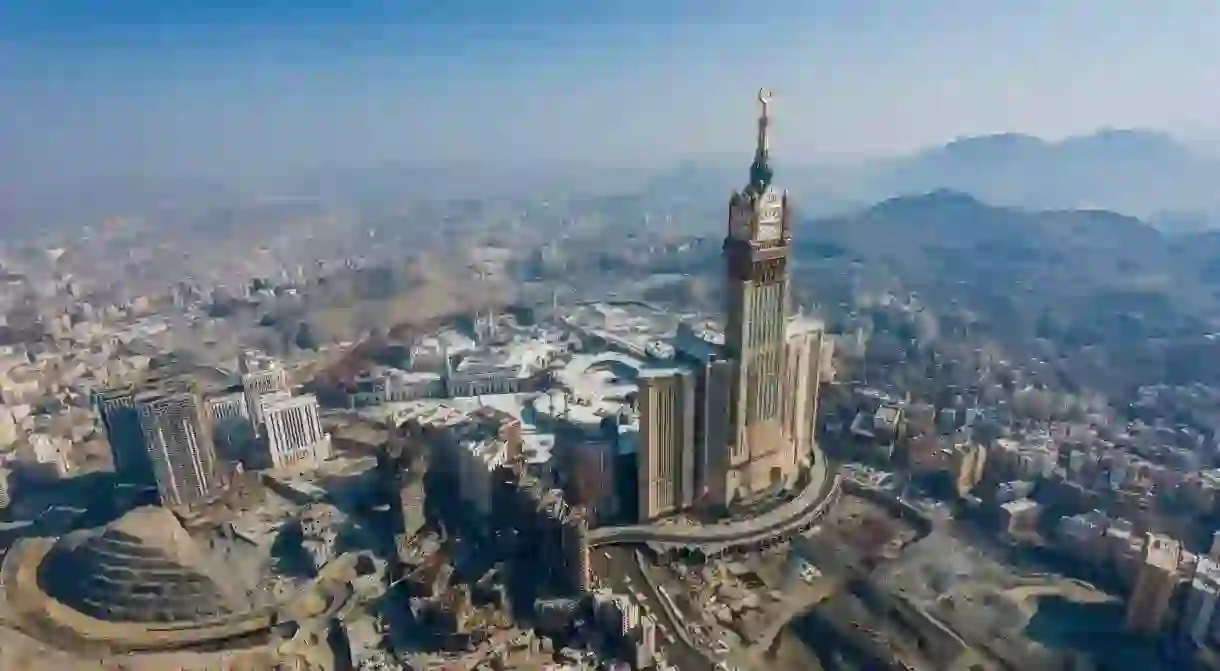Filmmaking in One of the Holiest Cities in the World

The annual pilgrimage of Hajj is one of the five fundamental pillars of Islam that all Muslims must undertake at least once in their lifetime. Now a documentary filmmaker has become the first to gain unrestricted access to the Haram in Mecca.

Eid al-Adha (Festival of the Sacrifice) is the second of two Islamic holidays that take place every year. The first, to mark the end of month of fasting, is Eid al-Fitr, but it is the three-day long Eid al-Adha that is the holier of the two.
Hajj, the pilgrimage to the “Haram” undertaken by Muslims at least once in their lifetime, also occurs during this period and marks the end of the Islamic calendar. The word haram has two meanings, one that translates as forbidden, and the other referring to holy or protected areas of sanctuary. The Al-Haram Mosque in Mecca is considered to be unchallenged in terms of religious importance and is a protected zone. At the centre of the mosque is the Kaaba, the most sacred site in Islam and the direction in which Muslims all over the world pray throughout the year.

British Muslim director Abrar Hussain is the first to gain full access to Mecca, shooting areas never previously seen on film for his documentary One Day in The Haram.
“National Geographic made a film there over 15 years ago titled Inside Mecca,” he says. “But if you watch it, as I did as part of my research, its noticeable that the access they were allowed was very sparse. What makes our film different, and unique historically compared to what has come before, is that we had complete and unrestricted access to every part of the Haram.”
The documentary offers viewers unrestricted access to the inner workings of this holy site, previously shrouded in mystery owing to limited footage and lack of access for non-Muslims. The film was shot at 4k resolution [giving the highest possible definition to the visuals] using a variety of ground-based, helicopter, and drone video recordings. But how do you secure the rights to make such a film given how difficult it has been in the past to shoot in Mecca?

“The critical thing for us was establishing the need for such a production,” says Hussain. “The way I looked at it, having watched and researched all the available archive footage from the Haram, was that there was a great disparity in the quality of footage available. From this I built a case to make a comprehensive film that would showcase the Haram to the world through very high quality images. I think that everyone involved really understood that this was something necessary, and something that was actually long overdue.”
In reality, a film like this couldn’t exist without the explicit approval of various government and religious agencies. Hussain says: “I think it’s very important to note that the film was directly supervised by the General President for the Affairs of the Two Holy Mosques, Dr Abdul Rahman Al-Sudais. This is the most senior person within the Haram and his support for the project played a key role in securing the buy in of the different departments within the Haram.”
It’s this involvement from various parties that Hussain said posed one of the biggest challenges in getting the film made. “I think the management of all the different stakeholders and their expectations was an incredibly difficult process. In Saudi Arabia everyone has a vested interest in anything to do with the Haram, and people can be very passionate about this. There are the religious authorities, the Government Ministries, the heads of the different departments, various officials within the Haram, as well as the sponsors, the hire companies, the distributors and our own filming crew.”

The location obviously plays an important part in the film, as well as in the lives all Muslims. For Hussain, its the film’s backdrop that impressed him most:
“Mecca [also referred to as Makkah] is surrounded by absolutely stunning landscapes, with the Haram as the centre point of the city. From the air you can really see how the city has grown around the Haram, it’s literally been carved from the mountains. The city is filled with the sacred history of Islam, and you feel the weight of this history when you gaze across the landscapes of the region.”
One Day in the Haram will be screened across the UK.
Tickets available by calling 03000 11 11 11 or by visiting www.pennyappeal.org/event/one-day-haram













